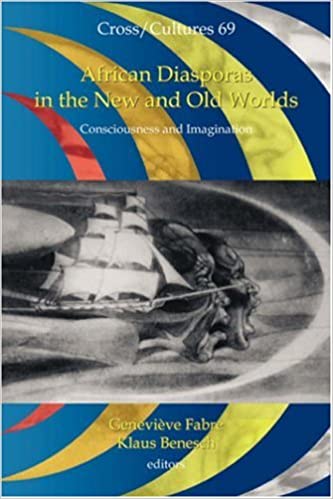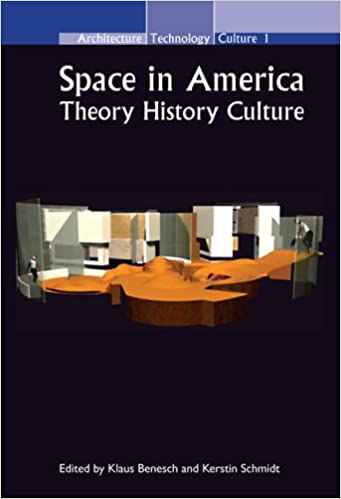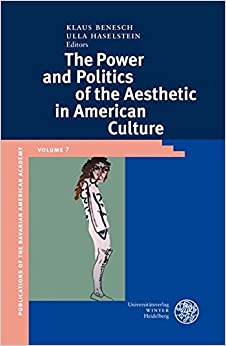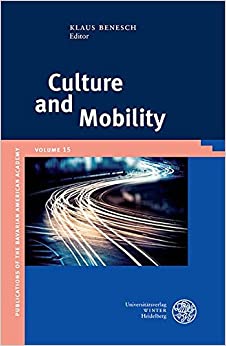Background
Klaus T. Benesch was born on February 21, 1958, in Karlsruhe, Baden-Wurttemberg, Germany.

Theresienstraße 39, 80333 München, Germany
Ludwig Maximilian University of Munich where Klaus Benesch received his Master of Arts and Doctor of Philosophy degrees.
Fahnenbergplatz, 79085 Freiburg im Breisgau, Germany
The University of Freiburg where Klaus Benesch received his Doctor of Philosophy with Habilitation degree.

(Literary critics have long regarded the rejection of tech...)
Literary critics have long regarded the rejection of technology as a distinguishing feature of American Romanticism. Yet as Klaus Benesch shows in this insightful study, the attitude of antebellum writers toward the advent of the machine age was far more complicated than often supposed.
https://www.amazon.com/gp/product/1558493239/ref=dbs_a_def_rwt_hsch_vapi_taft_p1_i0
2001

(In the humanities, the term 'diaspora' recently emerged a...)
In the humanities, the term 'diaspora' recently emerged as a promising and powerful heuristic concept. It challenged traditional ways of thinking and invited reconsiderations of theoretical assumptions about the unfolding of cross-cultural and multi-ethnic societies, about power relations, frontiers, and boundaries, about cultural transmission, communication, and translation. The present collection of essays by renowned writers and scholars addresses these issues and helps to ground the ongoing debate about the African diaspora in a more solid theoretical framework.
https://www.amazon.com/African-Diasporas-New-Worlds-Consciousness/dp/9042008709
2004

(America's sense of space has always been tied to what Hay...)
America's sense of space has always been tied to what Hayden White called the "narrativization" of real events. If the awe-inspiring manifestations of nature in America (Niagara Falls, Virginia's Natural Bridge, the Grand Canyon, etc.) were often used as a foil for projecting utopian visions and idealizations of the nation's exceptional place among the nations of the world, the rapid technological progress and its concomitant appropriation of natural spaces served equally well, as David Nye argues, to promote the dominant cultural idiom of exploration and conquest. From the beginning, American attitudes towards space were thus utterly contradictory if not paradoxical. In this book, topics include theories of Space, landscape, nature, technoscape, architecture, urban utopia, literature, performance, and others.
https://www.amazon.com/Space-America-History-Architecture-Technology/dp/9042018763
2005

(While the ubiquity of the aesthetic in contemporary socie...)
While the ubiquity of the aesthetic in contemporary society can hardly be denied, the reasons for the staggering aestheticizing of private and social practices are manifold and have recently been subject to controversial debates within the humanities. Arguably, postmodern consumer culture, new hedonistic lifestyles, or the spectacularization of the political sphere are just another form of Americanization, yet the specific 'American' dimension of these phenomena often remains blurry. As the essays collected here show, to simply conflate the aestheticization of everyday life with an American consumerist ideology predicated on packaging and surfaces largely disregards the complex and tangled history of the aesthetic in Western cultures.
https://www.amazon.com/Aesthetic-Publikationen-Bayerischen-Amerika-akademie-Publications/dp/3825353362
2007

(In 11 original essays, highly reputed scholars from both ...)
In 11 original essays, highly reputed scholars from both the United States and Europe take a fresh look at the plurality of contemporary scientific cultures and their respective methodologies and discursive practices. Each essay - if to varying degrees - also probes the regulatory political and institutional mechanisms that determine both the success and public acceptance and reputation of specific scientific cultures, particularly with respect to scientific ethics and the frequently invoked 'moral' obligation of scientists and researchers.
https://www.amazon.com/Scientific-Cultures-Technological-Transatlantic-Amerika-Akademie/dp/3825355802
2009

(Whether struggling in the wake of postindustrial decay or...)
Whether struggling in the wake of postindustrial decay or reinventing themselves with new technologies and populations, cities have once again moved to the center of intellectual and political concern. Rethinking the American City brings together leading scholars from a range of disciplines to examine an array of topics that illuminate the past, present, and future of cities. Rethinking the American City offers a lively and fascinating survey of contemporary thinking about cities in a transnational context.
https://www.amazon.com/Rethinking-American-City-International-Architecture/dp/081224561X
2013

(What connects the Baltimore Washington International Airp...)
What connects the Baltimore Washington International Airport and South Korea's Songdo International Business District? What are the cultural narratives that unfold from their bold visions of mobility and of the city in transit and transition? Put another way, what are the relations between modernity, mobile lifestyles, and urban spaces as we move deeper into what the French sociologist Marc Auge has called the age of 'supermodernity'? Perhaps more importantly, are there alternative ways of thinking about mobility and the future of society in a rapidly shrinking, globally interconnected, and, at the same time, socially and culturally divided world? In their wide-ranging contributions geographers, political scientists, historians, economists, and cultural critics take a closer look at mobility in an American context (and beyond). Investigating aspects of American mobility from a decidedly transnational and transatlantic perspective, these essays conjoin in revealing mobility as a crucial constituent of what we call modernity.
https://www.amazon.com/Mobility-Publikationen-Bayerischen-Amerika-akademie-Publications/dp/3825362353
2013

(This book gathers together an array of international scho...)
This book gathers together an array of international scholars, critics, and artists concerned with the issue of walking as a theme in modern literature, philosophy, and the arts. Covering a wide array of authors and media from eighteenth-century fiction writers and travelers to contemporary film, digital art, and artists' books, the essays collected here take a broad literary and cultural approach to the art of walking, which has received considerable interest due to the burgeoning field of mobility studies. Contributors demonstrate how walking, far from constituting a simplistic, naïve, or transparent cultural script, allows for complex visions and reinterpretations of a human's relation to modernity, introducing us to a world of many different and changing realities.
https://www.amazon.com/Walking-Aesthetics-Modernity-Pedestrian-Literature/dp/1137602821
2016
Klaus T. Benesch was born on February 21, 1958, in Karlsruhe, Baden-Wurttemberg, Germany.
Klaus Benesch began his studies at Ludwig Maximilian University of Munich and received a Master of Arts degree in 1986 and a Doctor of Philosophy degree in 1990. In 1999 he also obtained a Doctor of Philosophy with Habilitation degree from the University of Freiburg.
Klaus Benesch began his teaching career after receiving his master's degree in 1986. Before getting a doctor's degree in 1990, he was an instructor of American studies at Ludwig Maximilian University of Munich (LMU Munich). Then he joined Heinrich Heine University Düsseldorf as an adjunct professor of the department of English, a position he held till 1991. The next year, he again joined LMU Munich as an adjunct professor of American studies and was at the university till 1993. Then he became an assistant professor of the department of English/American studies at the University of Freiburg where he worked till 2000.
In 2000 Benesch became a full professor and chair of the department of English at the University of Bayreuth. In 2007 he returned to LMU Munich as a full professor and chair of the department of English and American studies. At the university, he was also dean of research at the School of Languages and Literatures from 2009 till 2011 and dean from 2011 till 2013 at the same school.
His teaching activity included also work in other countries. He was an exchange professor of the department of English at the University of Massachusetts and Weber State University and visiting professor and lecturer around the world.
It's also worth noting, that, during his career, Klaus has served as a reader for the University of Minnesota Press, University of Pennsylvania Press, University of Alabama Press, Palgrave-Macmillan (New York), Melus (the Journal of the Society for the Study of the Multi-Ethnic Literature of the United States), PoCoPages (Presses universitaires de la Méditerranée), African-American Review, Pacific Coast Philology: Journal of the Pacific Ancient and Modern Language Association, Amerikastudien/American Studies (an academic quarterly published by the German Association for American Studies), and Zeitschrift für Religions- und Geistesgeschichte. He is also a referee/reader for the German Research Foundation (DFG) and various other research and academic funding institutions, such as the Swiss SNF, the Belgium National Fund for Scientific Research (NFSR), Mercator Research Center Ruhr, and Deutsche Studienstiftung.
Klaus Benesch is also actively engaged in writing and contributing to writings. In Romantic Cyborgs: Authorship and Technology in the American Renaissance, by tracing the appearance both of cyborg figures and of other references to the commercialization of "literature" and to the reproducibility of texts and ideas in the works of canonical United States authors of the nineteenth century, Benesch shows that these authors were in fact more obsessed with the dialectic between nature and technology, organicity and mechanization than would allow them to align themselves purely with either column of the opposition.
With Geneviève Fabree he edited the famous book African Diasporas in the New and Old Worlds: Consciousness and Imagination. The book is dedicated to a general discussion of the concept of the African diaspora, its origins and historical development. It examines the complex cultural dimensions of African diasporas in relation to significant sites and figures, including the modes and modalities of creative expression from the perspective of both artists and writers and their audiences. It also focusses on the resources (collections and archives) and iconographies that are available today. As most authors argue, the African diaspora should not be seen merely as a historical phenomenon, but also as an idea or ideology and an object of representation. By exploring this new ground, the essays assembled here provide important new insights in American and African-American studies, cultural studies, ethnic studies, and African studies.
In The Power and Politics of the Aesthetic in American Culture, which Benesch edited, seven eminent literary and cultural historians from both Europe and the United States discuss the power and politics of the aesthetic in American culture (and elsewhere) with respect to multicultural diversity, fashion, the visual arts, aesthetic theory, the politics of race and sexuality, and, finally, America's response to the 9/11 attacks on New York.
His other known works include Walking and the Aesthetics of Modernity: Pedestrian Mobility in Literature and the Arts, Rethinking the American City: An International Dialogue, The Sea and the American Imagination, and others. His work is also represented in anthologies. He contributed to periodicals, including Callaloo, Contemporary Literary Criticism, Weber Studies, Comparison: International Journal of Comparative Literature, and Arbeiten aus Anglistik and Amerikanistik.
Klaus Benesch is an acknowledged educator known as a professor at Ludwig Maximilian University of Munich. For his teaching and research activity, he received numerous honors, including fellowships from the Bogliasco Foundation, Harry Ransom Humanities Research Center, University of Massachusetts Amherst, German Research Foundation, and others. He is also the recipient of a research and travel grant from the German Academic Exchange Service and an honorary member of the "Centre d'Études Africain Americaine Diasporique" in Paris, France.
For his writings, he was also the recipient of awards, including the Publication Award and American Studies Award (1990) from the Amerika-Institut at the Ludwig Maximilian University of Munich and the Oskar-Karl-Forster publication grant for the publication of The Threat of History: Narrative Discourse and Historical Consciousness in Contemporary Afro-American Fiction.
(What connects the Baltimore Washington International Airp...)
2013(While the ubiquity of the aesthetic in contemporary socie...)
2007(In 11 original essays, highly reputed scholars from both ...)
2009(Whether struggling in the wake of postindustrial decay or...)
2013(This book gathers together an array of international scho...)
2016(Literary critics have long regarded the rejection of tech...)
2001(America's sense of space has always been tied to what Hay...)
2005(In the humanities, the term 'diaspora' recently emerged a...)
2004
Quotations:
"If, as Friedrich Nietzsche put it, there are no facts prior to what we call interpretation, then writing, academic and otherwise, is an important means to participate in and contribute to the processes of turning mere events into meaningful experiences."
"The glimmering hope that my reading of literary texts might eventually if only on a very small scale influence the perception and understanding of those texts by other readers has always been an important incentive for my own work. By the same token, I never found critical writing a tedious chore. Rather, to give voice to your thoughts and ideas so as to allow other people to share, argue with you, and occasionally dismiss these ideas has always been extremely gratifying for me."
Klaus Benesch is a member of the Rocky Mountain Modern Language Association, American Studies Association, Poe Studies Association, Society for Literature and Science, Collegium for African American Research, European Association for American Studies, German Association for American Studies, and Bavarian American Academy. He is a member of the advisory board of Revue Française d'Études Américaines and of the editorial board of Prospettive Americane, published by LT2 (Venice).
Also, he is an honorary member of the Centre d'Études Africain Americaine Diasporique in Paris, France.
director
Bavarian American Academy , Germany
2007 - 2013
board member
Bavarian American Academy , Germany
2002 - 2014
member of the Delegate Assembly
Modern Language Association , United States
2003 - 2006
member of the research group "The Representation of Slavery in Literature and the Arts" at the Gilder Lehrman Center for the Study of Slavery, Resistance, and Abolition
Yale University , United States
2005 - 2006
member of the editorial board of American Studies Encyclopedia Online
American Studies Association , United States
2007 - 2010
